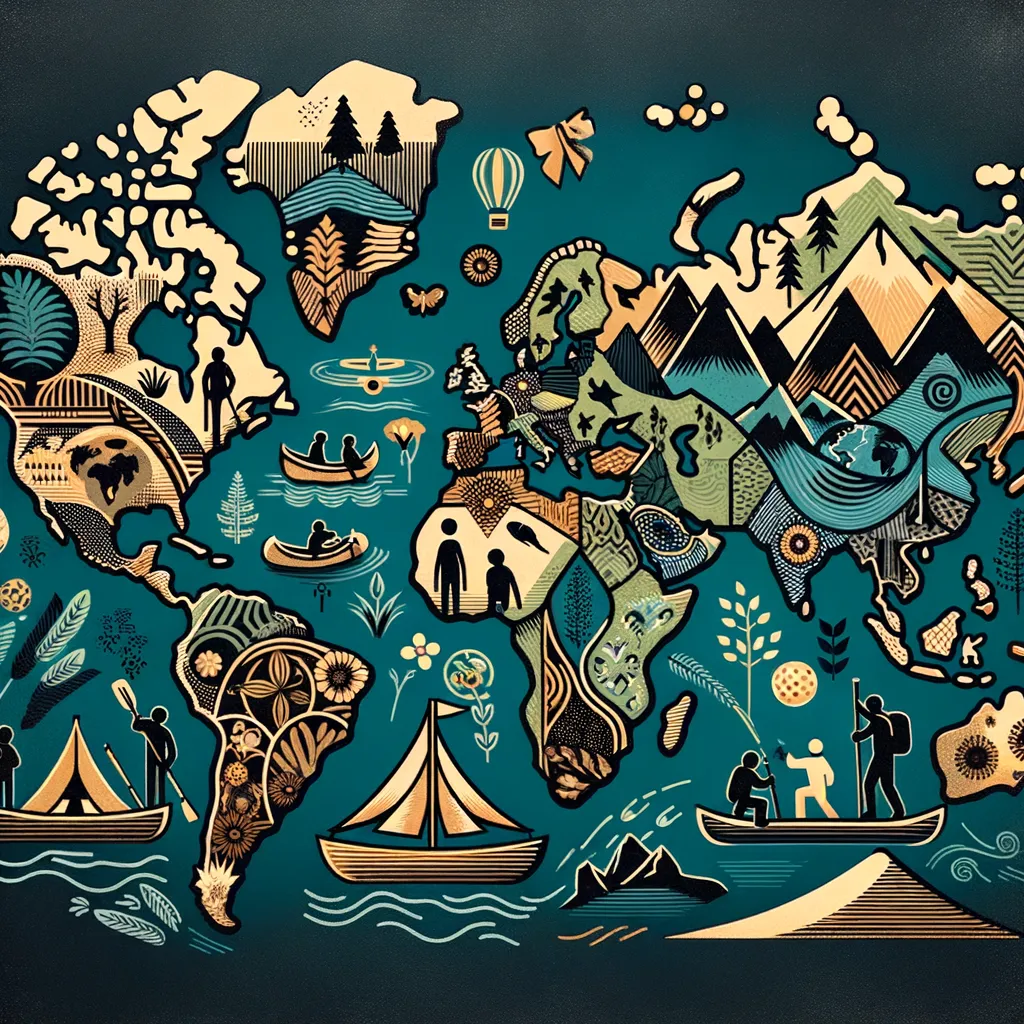Exploring Outdoor Education Across the Globe: A Guide for Parents
Welcome to our detailed guide designed for parents interested in how outdoor education varies around the globe. As more families seek to enrich their children’s learning experiences beyond the classroom walls, understanding the diverse approaches to outdoor education worldwide becomes essential. This guide aims to shed light on the various educational philosophies and programs that utilize the great Outdoors as a classroom, highlighting the unique benefits and practices across different cultures and regions. For those looking to dive deeper into the world of camping and outdoor education, a Great read on camping is a must.
Outdoor education is not a one-size-fits-all concept; it encompasses a wide range of activities, from wilderness expeditions and adventure sports to environmental education and community service projects. Different countries and educational systems have embraced and adapted outdoor education in ways that reflect their unique environmental landscapes, cultural values, and educational goals.
In countries like Norway, outdoor education, or “friluftsliv,” is deeply embedded in the culture. It emphasizes a simple, yet profound connection with nature, encouraging students to engage with the outdoors regularly for both leisure and learning. Contrastingly, in places like Japan, outdoor education often takes the form of “Shinrin-yoku” or forest bathing, focusing on the therapeutic aspects of spending time in nature to reduce stress and enhance well-being.
The United Kingdom’s approach to outdoor education heavily emphasizes adventure and challenge, with programs incorporating activities like hiking, kayaking, and rock climbing to build resilience, teamwork, and leadership skills amongst students. These experiences are not only about learning new skills but also about developing a sense of responsibility towards the environment and society.
In the United States, outdoor education varies significantly from one region to another, reflecting the country’s vast geographical diversity. Programs often aim to foster environmental stewardship and outdoor skills, coupled with science education and cultural history. This holistic approach ensures students not only learn about the natural world but also understand their role in conserving it.
Australia and New Zealand are renowned for their adventurous spirit and rich indigenous cultures, which are often integrated into their outdoor educational programs. From bush walks and kayaking to exploring the rich Maori and Aboriginal heritage, these programs offer students unique opportunities to connect with the land and its original caretakers. This approach fosters a deep respect for cultural diversity and environmental conservation.
Outdoor education in Scandinavian countries further exemplifies how societal values shape educational practices. In Sweden, Denmark, and Finland, for example, outdoor learning begins from an early age, with preschool children spending a significant part of their day outdoors, all year round. This early introduction to the outdoors aims to instill a lifelong connection with nature, promoting physical, emotional, and social development.
As we delve deeper into the various forms of outdoor education worldwide, it becomes clear that despite their differences, these approaches share common goals: to foster a connection with nature, develop personal and social competencies, and promote an active and healthy lifestyle. In the following sections, we will explore the specific educational outcomes associated with outdoor learning, examine the challenges and benefits of implementing these programs, and share insights from educators and families who have embraced the outdoor education journey.
It is intriguing to observe how different cultures and regions worldwide have shaped their educational systems to include and prioritize outdoor learning experiences. As we continue, we’ll look more closely at the methodologies, benefits, and challenges of outdoor education from various global perspectives, providing valuable insights for parents looking to enrich their children’s learning experiences with the beauty and lessons offered by the great outdoors.

Exploring Outdoor Education Across the Globe: A Guide for Parents
Welcome to our comprehensive guide for parents on the diverse world of outdoor education. In a time when enriching our children’s education through experiences beyond traditional classroom walls is more important than ever, understanding how outdoor education functions across different cultures and regions is key. This guide will dive into the myriad of ways outdoor education is approached worldwide, highlighting the significant benefits and practices particular to each area.
Outdoor education transcends a uniform definition, offering a kaleidoscope of activities ranging from wilderness adventures and environmental stewardship to community service and cultural immersion. The adaptation of outdoor education across borders mirrors the distinctive landscapes, cultural values, and educational ambitions specific to each country.
1. The Integration of Culture and Nature in Outdoor Learning
In Norway, the concept of “friluftsliv” deeply intertwines outdoor education with cultural identity, fostering a straightforward yet enriching connection with nature. In contrast, Japan’s “Shinrin-yoku,” or forest bathing, exemplifies the therapeutic focus of spending time in wooded environments, aiming to decrease stress while enhancing overall well-being.
The United Kingdom leverages the adventurous spirit, incorporating activities like hiking and rock climbing into their educational programs to instil resilience, team-building, and leadership skills. These exercises go beyond mere physical activity, embedding a sense of responsibility towards the preservation of the environment and society at large.
In the expansive landscapes of the United States, outdoor education reflects the country’s vast geographical diversity, with programs tailored to blend environmental stewardship, outdoor skills development, and the exploration of cultural history. Such a comprehensive approach empowers students to appreciate the natural world and recognize their role in its conservation.
2. The Adventurous and Cultural Approaches in Australia and New Zealand
Adventurous spirits thrive in the outdoor educational programs of Australia and New Zealand, where deep-seated indigenous cultures play a pivotal role. Engaging in activities like bushwalking and kayaking while exploring Maori and Aboriginal heritage offers students unparalleled opportunities to connect with the land and understand the legacy of its original caretakers, fostering a profound appreciation for cultural diversity and environmental conservation.
3. Emphasizing Early Outdoor Interactions in Scandinavian Countries
Scandinavia exemplifies the societal value placed on outdoor education, with countries like Sweden, Denmark, and Finland introducing children to outdoor learning from an early age. Such practices underscore the belief in nurturing a lifelong bond with nature, advocating for the physical, emotional, and social benefits derived from regular outdoor engagement.
4. Shared Goals Despite Diverse Methodologies
Despite the varied methodologies employed across different cultures, outdoor education worldwide shares the overarching aims of fostering nature connections, developing personal and social competencies, and promoting active, healthy lifestyles. This section will delve into the educational outcomes tied to outdoor learning, discuss the challenges and advantages of these programs, and provide insights from educators and families committed to this educational path.
5. The Beauty of Global Outdoor Education Perspectives
The inclusion and prioritization of outdoor learning within educational systems around the world reflect a collective acknowledgment of its value. As we proceed, we will examine the array of methodologies, highlight the benefits, and address the challenges faced by outdoor education globally. These reflections provide invaluable insights for parents eager to enhance their children’s learning experiences through the profound lessons and beauty offered by the great outdoors.
Outdoor education provides a dynamic platform for learning that can significantly enrich a child’s development, instilling in them not only a respect for nature and culture but also crucial life skills. By exploring and understanding the varying approaches to outdoor education employed around the world, parents can find inspiration to integrate these valuable experiences into their own children’s educational journeys, fostering a more informed, resilient, and compassionate generation.
Disclaimer
The articles available via our website provide general information only and we strongly urge readers to exercise caution and conduct their own thorough research and fact-checking. The information presented should not be taken as absolute truth, and, to the maximum extent permitted by law, we will not be held liable for any inaccuracies or errors in the content. It is essential for individuals to independently verify and validate the information before making any decisions or taking any actions based on the articles.



